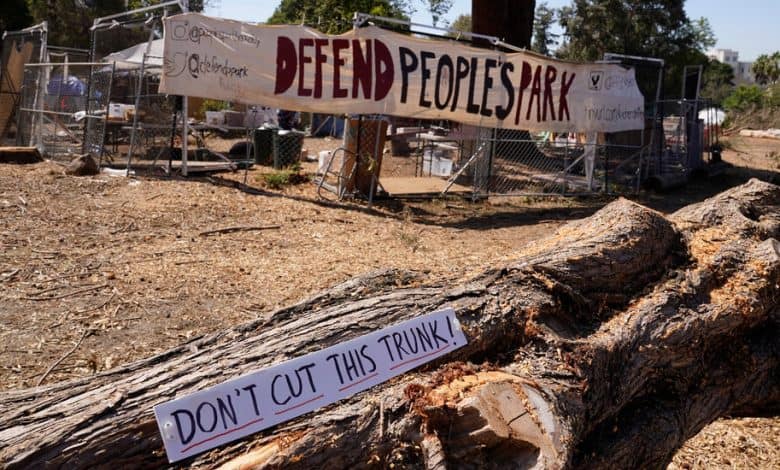In Overnight Sweep, Police in Berkeley Clear Protesters From People’s Park

A fraught battle to build long-sought student housing at the storied People’s Park in Berkeley, Calif., took an extraordinary turn early on Thursday when hundreds of law enforcement officers surrounded the site and removed several dozen activists and homeless campers in preparation for the construction of a wall of shipping containers around the perimeter of the park.
The midnight operation, conducted while most students at the nearby University of California, Berkeley, were still away for the winter break, was the latest effort to proceed with a $312 million construction project that was originally scheduled to break ground in 2022. It underscored the mounting tensions surrounding California’s acute housing shortage, particularly in college towns.
Law enforcement officers far outnumbered activists at the site who had been tipped off about the operation and who greeted the show of force from trees and tents pitched in the darkness.
“We’re trying to let people leave, but if they refuse, they’re being arrested,” Dan Mogulof, a university spokesman, said by phone from inside the police perimeter at about 2 a.m. “Everyone was offered shelter. A few took us up on it. But some of the activists are still on the site. I’m looking at a couple perched on the roof of the park bathroom and a couple in a tree fort right now.”
About two hours later, the authorities said the site had been cleared, and construction crews prepared to double-stack about 160 empty shipping containers to wall off the park site.
By dawn, seven activists had been arrested on misdemeanor charges of trespassing and failure to disperse, and had been cited and released, the university said.
Of the eight homeless people who were in the park when the authorities arrived, Mr. Mogulof said, three accepted offers of transitional housing and the rest left voluntarily.
The university provides housing for only 23 percent of its students, by far the lowest percentage in the 10-campus University of California system. A plan to build 1,100 new units of student housing and 125 units of supportive housing for homeless people on part of the park site, which is owned by the university, has been repeatedly delayed since last summer.
A small contingent of Berkeley residents and activists has pushed aggressively to preserve the entire park, which was the center of bloody counterculture protests in the 1960s. In late February last year, a state appeals court in San Francisco sided with the development plan’s opponents, who claimed that the university had failed to conduct environmental reviews required by state law. An appeal to the California Supreme Court is pending.
The university has struggled to cordon off the property, which is strewed with litter and graffiti, and to deter encampments. In August 2022, when the university tried to fence the site, large protests erupted and the crowd tore the fence down.
Since then, Mr. Mogulof said, the city and university have spent more than $6 million to lease motel space and move homeless people occupying the park into shelter and supportive housing, including an initiative in November when most of the roughly two dozen people who were still camped on the site were moved into a local motel.
University officials acknowledged that construction could not begin until the environmental review question was settled by the courts, but they said that the site’s legal status as a closed construction zone had been “repeatedly affirmed,” and that fencing the park was vital to preventing a resurgence of crime and new encampments on the property.
“Given that the existing legal issues will inevitably be resolved, we decided to take this necessary step now, in order to minimize disruption for the public and our students when we are eventually cleared to resume construction,” the chancellor of U.C. Berkeley, Carol Christ, said in a prepared statement.
“Unfortunately, our planning and actions must take into account that some of the project’s opponents have previously resorted to violence and vandalism,” she said, “despite strong support for the project on the part of students, community members, advocates for unhoused people, the elected leadership of the City of Berkeley, as well as the legislature and governor of the state of California.”
